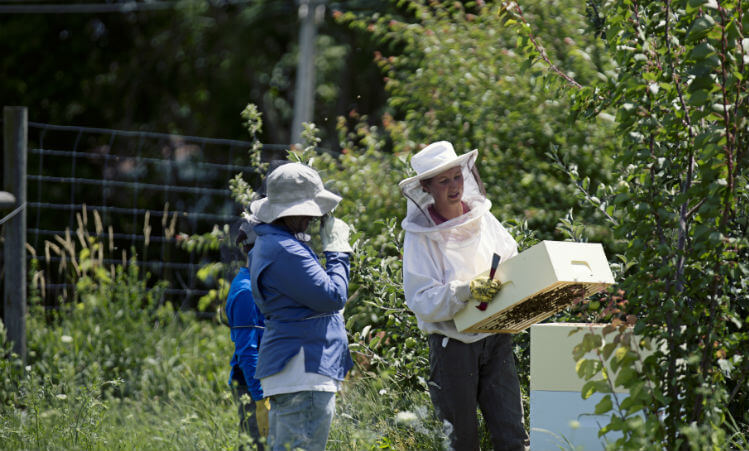 In our efforts to improve agricultural sustainability, The FruitGuys Community Fund awarded $40,133 to ten independent farmers from California to Pennsylvania. Each recipient was chosen based on how well their sustainability project fit into the 2016 areas of focus: pollination, soil health, water conservation, energy efficiency and increasing low-income consumers’ access to fresh produce.
In our efforts to improve agricultural sustainability, The FruitGuys Community Fund awarded $40,133 to ten independent farmers from California to Pennsylvania. Each recipient was chosen based on how well their sustainability project fit into the 2016 areas of focus: pollination, soil health, water conservation, energy efficiency and increasing low-income consumers’ access to fresh produce.
The 2016 grantees are: Buffalo Street Farm in Detroit, MI; Butterbee Farm in Pikesville, MD; Canvas Ranch in Ukiah, CA; Casa Rosa Farms in Woodland, CA; FARM Davis in Davis, Ca; From the Ground Up Farms in Chico, CA; Sunnyside Farm in Dover, PA; Troy Community Farm in Madison, WI; Turtle Creek Gardens in Delavan, WI; Two Boots Farm in Hampstead, MD.
Buffalo Street Farm
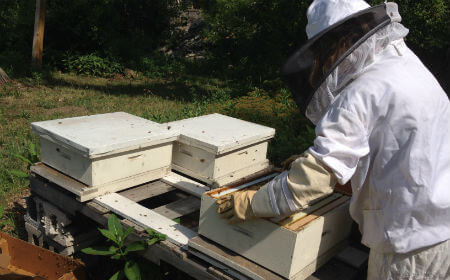 Buffalo Street Farm used their $5,000 funding to help plant a mixed fruit orchard, actively using land that would otherwise sit empty in Detroit, Michigan. The orchard, providing a much-needed area of green, offers something positive in a neighborhood suffering from urban blight. With the help from a few neighborhood children, the Buffalo Street Farm team marked out the planting locations for the new trees. 100 trees have been planted and mulched. So far the new fruit trees are healthy, with only a few lost during the process.
Buffalo Street Farm used their $5,000 funding to help plant a mixed fruit orchard, actively using land that would otherwise sit empty in Detroit, Michigan. The orchard, providing a much-needed area of green, offers something positive in a neighborhood suffering from urban blight. With the help from a few neighborhood children, the Buffalo Street Farm team marked out the planting locations for the new trees. 100 trees have been planted and mulched. So far the new fruit trees are healthy, with only a few lost during the process.
They also used the grant to purchase three beehives and an irrigation system. While one beehive was lost, the remaining hives are thriving. Farm staff is proactively maintaining the hives to prevent disease.
Butterbee Farm
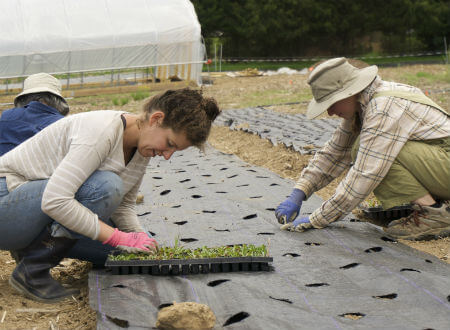 Butterbee Farm used their $3,200 grant to cultivate an acre of land (formerly part of a conventional farm) into sustainable production by applying a cover crop, compost, soil amendments, and pollinator-friendly plants. The extra land will help the farm grow sales by 20%. On that acre they have built some new beds, raising the pH level, adding lime, rock phosphate, and cottonseed meal. They have used some of the space for a cover crops, while planting monarda on one side of the farm, and mock orange trees elsewhere. They also bought a BCS tractor, which will allow them to easily maintain permanent raised beds and farm in a way that protects soil structure.
Butterbee Farm used their $3,200 grant to cultivate an acre of land (formerly part of a conventional farm) into sustainable production by applying a cover crop, compost, soil amendments, and pollinator-friendly plants. The extra land will help the farm grow sales by 20%. On that acre they have built some new beds, raising the pH level, adding lime, rock phosphate, and cottonseed meal. They have used some of the space for a cover crops, while planting monarda on one side of the farm, and mock orange trees elsewhere. They also bought a BCS tractor, which will allow them to easily maintain permanent raised beds and farm in a way that protects soil structure.
Visitors also provide a growing source of revenue, with the farm seeing over 75 visitors at the farm so far this season from various different backgrounds. Some of these visitors have even become farm volunteers! To encourage more visitors, Butterbee Farm has held photography classes, a head-crown making class, flower farming all day workshops, and
three open houses.
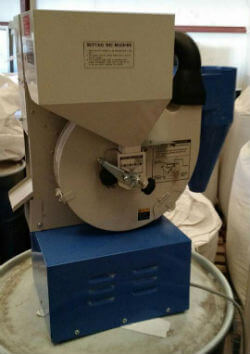
Canvas Ranch
Canvas Ranch is using their $2,500 grant for a grain dehuller to serve their farm and as well as other small grain growers in the northern California counties within the North Coast Heritage Grain Alliance. A dehuller is a vital, but costly, piece of equipment needed for grains such as oats, emmer, and spelt. The dehuller was put into immediate use, hulling the emmer harvested last fall. Canvas Ranch sees the new piece of equipment as a shared resource, one more step in continuing growth of local grain farming which is key to small farm diversification.
Casa Rosa Farms
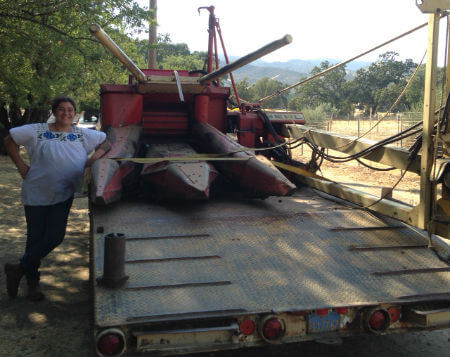 Casa Rosa Farms spent their $5,000 grant money on purchasing a forage/silage harvester to help them cut and graze crops. After purchasing the harvester, they had some initial problems with ‘temperamental’ delivery staff, leaving half of the harvester on one farm, and half on their own.
Casa Rosa Farms spent their $5,000 grant money on purchasing a forage/silage harvester to help them cut and graze crops. After purchasing the harvester, they had some initial problems with ‘temperamental’ delivery staff, leaving half of the harvester on one farm, and half on their own.
However, once they put the parts together the plan is to get the machine set up and working in time for next Spring, which is when it will be most useful. Although they may get the chance to test it out with some late summer crops, depending on how the season goes.
FARM Davis
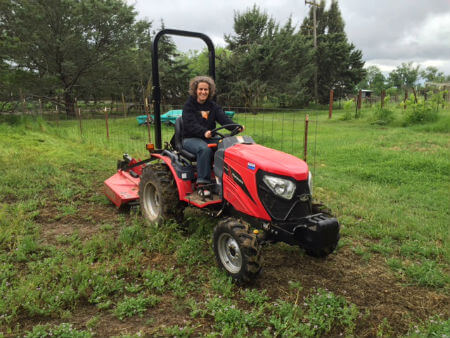 Using money from their $2,133 grant, FARM Davis purchased a mower implement and supplies for the owl boxes. The first owl box was built and they are waiting for their first resident (which can take up to 3 years for an owl to move in). Plans are also underway for their first owl-box building workshop with the City of Davis wildlife specialist.
Using money from their $2,133 grant, FARM Davis purchased a mower implement and supplies for the owl boxes. The first owl box was built and they are waiting for their first resident (which can take up to 3 years for an owl to move in). Plans are also underway for their first owl-box building workshop with the City of Davis wildlife specialist.
With the new mowing equipment, FARM Davis’ grasses are now high enough to provide habitat for the rodent population, but low enough for owls to spot them. Building the new owl boxes are designed to encourage more of these rodent-hunting birds to the area.
“We have had far less damage to our crops this summer” said Robyn Waxman the farm’s Executive director. “A giant pomegranate tree that was completely decimated last year is still in great shape with zero rat damage. There is also less evidence of gopher activity this summer, although we did lose about half of their bean crops and 1/3 of our eggplants.”
From the Ground Up Farms
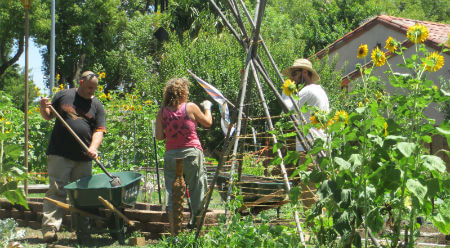 From the Ground Up Farms added 8 raised beds and improved irrigation so far at Kentfield Gardens, Stairways Programming, Avenida Apartments, Chico Community Children’s Center, Brandon’s House and the Celebration House, all using their $4,855 FruitGuys grant. They are also placing orders for bricks, soil and irrigation for the House of Hope.
From the Ground Up Farms added 8 raised beds and improved irrigation so far at Kentfield Gardens, Stairways Programming, Avenida Apartments, Chico Community Children’s Center, Brandon’s House and the Celebration House, all using their $4,855 FruitGuys grant. They are also placing orders for bricks, soil and irrigation for the House of Hope.
Not only have they made great improvements to existing gardens, but they have been able to install gardens and begin growing food for new facilities too. They feel honored to sit down and help a home full of formerly homeless people install their first garden. Together they plant all kinds of veggies and every time they go check on them, the attendees have great questions and total participation.
One thing they have been able to purchase is workshop and education supplies. Now their attendees can do more than just watch. They get hands-on experience and have something to take home, allowing the lesson to continue after they have left the farm.
Sunnyside Farm
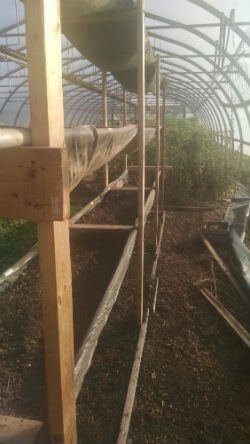 Sunnyside Farm’s $5,000 grant went towards setting up a hoop house with a built-in drip tape system. They have the organic leaf mold and spinach seeds. Initially, for consistency, they will plant only spinach so they can compare germination, production, and yield to crops outside of the hoop house.
Sunnyside Farm’s $5,000 grant went towards setting up a hoop house with a built-in drip tape system. They have the organic leaf mold and spinach seeds. Initially, for consistency, they will plant only spinach so they can compare germination, production, and yield to crops outside of the hoop house.
When temperatures cool later in the year (spinach grows much better in cool and cold weather) they plan to plant seeds, get drip tape down and see how well the production fares during the winter.
Troy Community Farm
The Troy Community Farm used their $2,500 grant to purchase some Nuc hives to expand their apiary. The new hives were strong and healthy, and have helped to supplement their existing hives. One of the hives even swarmed, the day after purchasing, into a new hive, giving Troy Community farm another hive!
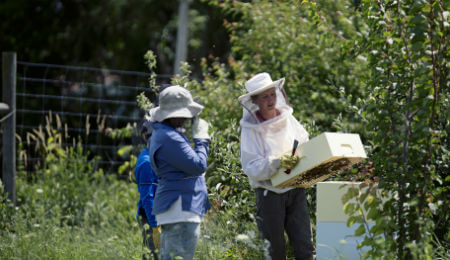 So far they have seen a number of positive outcomes. The field next to the bees has a clover cover crop which has proved very popular with their bee population. They were also able to pull a small amount of early season honey (10 lbs) and have already sold 7 lbs of it (in 8oz jars). At the time of writing, they are about to do their large honey harvest and have arranged to rent a big extractor from their local beekeeper supplier. Though it is hard to quantify, their crops have all been well pollinated and they have seen great yields on several of them this year. If everything goes well over the winter, they hives will produce an even larger honey crop in 2017.
So far they have seen a number of positive outcomes. The field next to the bees has a clover cover crop which has proved very popular with their bee population. They were also able to pull a small amount of early season honey (10 lbs) and have already sold 7 lbs of it (in 8oz jars). At the time of writing, they are about to do their large honey harvest and have arranged to rent a big extractor from their local beekeeper supplier. Though it is hard to quantify, their crops have all been well pollinated and they have seen great yields on several of them this year. If everything goes well over the winter, they hives will produce an even larger honey crop in 2017.
Turtle Creek Gardens
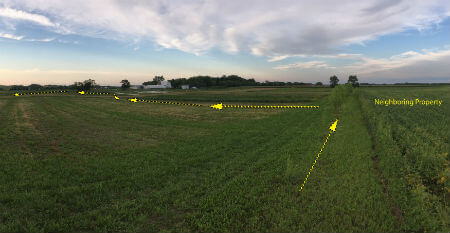 This 18-acre farm is using their $5,000 grant to construct swales to mitigate rainwater runoff from a neighboring convention farm as well as prevent rainwater flooding interior areas. The swales will consist of grasses, forbs, perennials, and marketable crops. So far Turtle Creek Gardens has gathered elevation data so they can complete a detailed layout and design of their project. Their biggest hurdle is grading and determining the best way to funnel water away from flood-prone areas.
This 18-acre farm is using their $5,000 grant to construct swales to mitigate rainwater runoff from a neighboring convention farm as well as prevent rainwater flooding interior areas. The swales will consist of grasses, forbs, perennials, and marketable crops. So far Turtle Creek Gardens has gathered elevation data so they can complete a detailed layout and design of their project. Their biggest hurdle is grading and determining the best way to funnel water away from flood-prone areas.
Two Boots Farm
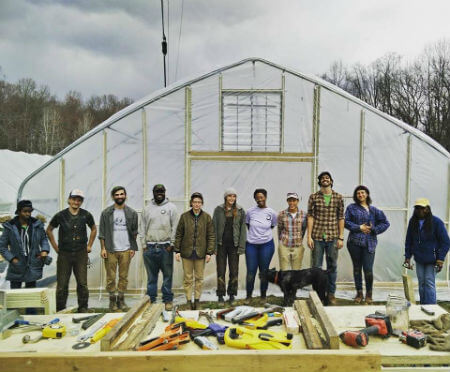 With their $5,000 grant, Two Boots Farm built a 72’x24’ high tunnel in May enlisting the help of volunteers, trainees, and employees. They were able to build the tunnel early enough in the season to get a good crop of tomatoes and cucumbers growing.
With their $5,000 grant, Two Boots Farm built a 72’x24’ high tunnel in May enlisting the help of volunteers, trainees, and employees. They were able to build the tunnel early enough in the season to get a good crop of tomatoes and cucumbers growing.
As their research predicted, they were able to maximize the productivity of the tomato and cucumber crops by growing vertically. In the past they had grown tomatoes and cucumbers in the field, which could not be spaced as close together which resulted in lower yields per square foot.
“An unexpected benefit to growing our tomatoes in the high tunnel was having less disease pressure. Every year our tomato crop is heavily damaged by early blight, a disease that is soil and airborne which eventually kills the tomato plants resulting in decreased yields. We found virtually no disease to our high tunnel-grown tomatoes. And, to this day, they are still producing tomatoes. This was an unexpected benefit growing in the high tunnel and we are considering only growing tomatoes in the high tunnel in the future for this reason.” said Elisa Lane the farm’s owner.
Apart from tomatoes they also have ginger, turmeric, and lemongrass growing in the high tunnel and have already started taking some ginger and lemongrass to market. People have been thrilled to see it as it’s uncommon to have these items locally grown in the Mid-Atlantic region. Having these crops at our markets helps Two Boots stand out and draws customers to their stand, helping them reach economic sustainability on their farm.
At the moment they are starting to get the tunnel ready for our fall/winter crops and looking forward to harvesting from the high tunnel all season long.
The Final Dirt
The 2016 grantees will share final highlights from their sustainability projects in December. Know a small independent farmer? The FruitGuys Community Fund will issue its call for applications for the 2017 grant cycle in December 2016.
Want to get involved? Volunteer for our Grant Review Committee! You can help decide which projects get funded in 2017.




